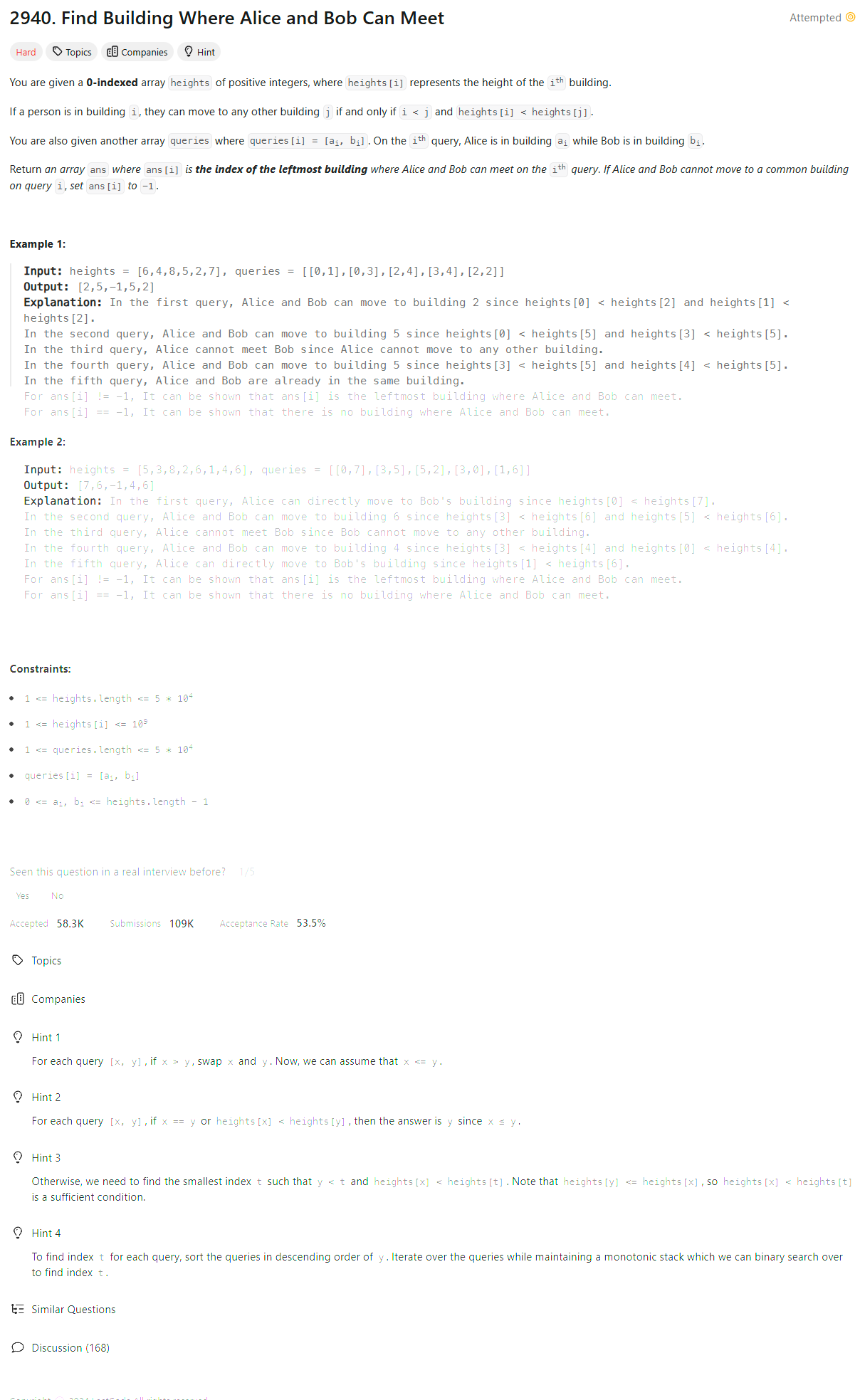Problem of The Day: Find Building Where Alice and Bob Can Meet
Problem Statement

Brute Force [TLE]
class Solution:
def leftmostBuildingQueries(self, heights: List[int], queries: List[List[int]]) -> List[int]:
N = len(heights)
res = []
for alice, bob in queries:
if alice > bob:
alice, bob = bob, alice
for left in range(bob, N):
if alice == bob or heights[alice] < heights[bob]:
res.append(bob)
break
if heights[left] > heights[alice] and heights[left] >= heights[bob]:
res.append(left)
break
else:
res.append(-1)
return res
Editorial Solution
Approach 1: Monotonic Stack
-
Prepare for Queries:
- Initialize a stack (
mono_stack) to keep track of building heights in decreasing order. - Create a result array initialized with
-1to store the answers for each query. - Group queries by their “b” value to process efficiently.
- Initialize a stack (
-
Handle Simple Cases:
- For each query, if the height of building “b” is greater than building “a” (or if they are the same), directly assign
bas the result.
- For each query, if the height of building “b” is greater than building “a” (or if they are the same), directly assign
-
Process Complex Cases with Monotonic Stack:
- Traverse the
heightsarray from right to left. - For each height, check pending queries:
- Use binary search (
searchmethod) on the monotonic stack to find the appropriate leftmost building index for the current query.
- Use binary search (
- Maintain the stack by removing heights smaller than the current height, ensuring it remains in decreasing order.
- Traverse the
-
Binary Search Helper:
- The
searchmethod is used to find the leftmost building taller than the given height using binary search on the stack.
- The
Complexity
- Time Complexity:
\(O(n + q \cdot \log(n))\)
Wherenis the number of buildings andqis the number of queries. - Space Complexity:
\(O(n + q)\)
For storing the stack and grouped queries.
class Solution:
def leftmostBuildingQueries(self, heights, queries):
mono_stack = []
result = [-1 for _ in range(len(queries))]
new_queries = [[] for _ in range(len(heights))]
for i in range(len(queries)):
a = queries[i][0]
b = queries[i][1]
if a > b:
a, b = b, a
if heights[b] > heights[a] or a == b:
result[i] = b
else:
new_queries[b].append((heights[a], i))
for i in range(len(heights) - 1, -1, -1):
mono_stack_size = len(mono_stack)
for a, b in new_queries[i]:
position = self.search(a, mono_stack)
if position < mono_stack_size and position >= 0:
result[b] = mono_stack[position][1]
while mono_stack and mono_stack[-1][0] <= heights[i]:
mono_stack.pop()
mono_stack.append((heights[i], i))
return result
def search(self, height, mono_stack):
left = 0
right = len(mono_stack) - 1
ans = -1
while left <= right:
mid = (left + right) // 2
if mono_stack[mid][0] > height:
ans = max(ans, mid)
left = mid + 1
else:
right = mid - 1
return ans
Approach 2: Priority Queue
-
Initialization:
max_idx: A min-heap (priority queue) to store queries for efficient processing.results: A list initialized with-1to store the result for each query.store_queries: A list of lists, where each inner list stores queries associated with a specific building index.
-
Preprocessing Queries:
- Iterate over each query
(a, b):- If one building’s height is strictly less than the other and the order is satisfied (
heights[a] < heights[b]or vice versa), directly assign the result. - If the heights are equal or no immediate result can be determined, store the query in
store_queriesbased on the larger index ofaorb.
- If one building’s height is strictly less than the other and the order is satisfied (
- Iterate over each query
-
Processing Heights:
- Traverse the
heightslist:- Resolve Pending Queries:
- While the smallest height in the heap (
max_idx[0]) is less than the current building’s height, it means the current building satisfies that query. - Pop such queries from the heap and assign the current index to the corresponding result in
results.
- While the smallest height in the heap (
- Add New Queries:
- Push queries from
store_queries[idx](associated with the current index) into the heap. Store them as tuples(max(height_a, height_b), query_index)for efficient processing.
- Push queries from
- Resolve Pending Queries:
- Traverse the
-
Return Results:
- After processing all heights and queries, return the
resultslist.
- After processing all heights and queries, return the
class Solution:
def leftmostBuildingQueries(self, heights, queries):
max_idx = [] # Min-heap to simulate priority queue
results = [-1] * len(queries)
store_queries = [[] for _ in heights]
# Store the mappings for all queries in store_queries.
for idx, query in enumerate(queries):
a, b = query
if a < b and heights[a] < heights[b]:
results[idx] = b
elif a > b and heights[a] > heights[b]:
results[idx] = a
elif a == b:
results[idx] = a
else:
store_queries[max(a, b)].append(
(max(heights[a], heights[b]), idx)
)
for idx, height in enumerate(heights):
# If the heap's smallest value is less than the current height, it is an answer to the query.
while max_idx and max_idx[0][0] < height:
_, q_idx = heapq.heappop(max_idx)
results[q_idx] = idx
# Push the queries with their maximum index as the current index into the heap.
for element in store_queries[idx]:
heapq.heappush(max_idx, element)
return results